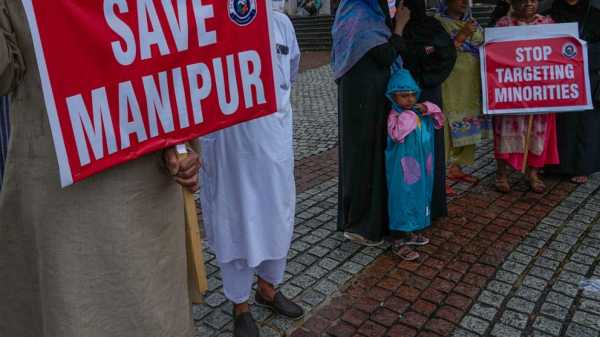
NEW DELHI — His social media accounts suggest that Prime Minister Narendra Modi is launching high-speed trains and rubbing shoulders with foreign leaders as a powerhouse on the global stage and the face of an ascendant India.
But that carefully crafted image, followed by millions, sits uncomfortably at odds with his silence on what's come close to a civil war engulfing India's northeastern state of Manipur.
For three months, the strongman leader has been absent on arguably the worst ethnic violence ever seen in the remote state, where Modi’s Hindu nationalist Bharatiya Janata Party is in power. Modi's role, or lack thereof, has sparked a no-confidence motion against him in Parliament, where his government holds the majority.
He will almost certainly defeat the effort this week. But proponents of the motion are betting that just bringing it up will force Modi to address the Manipur crisis from the floor of Parliament.
MODI’S SILENCE
More than 150 people have died and over 50,000 displaced after ethnic clashes in Manipur erupted in early May.
The conflict was triggered by an affirmative action controversy in which Christian Kukis protested a demand by mostly Hindu Meiteis for a special status that would let them buy land in the hills populated by Kukis and other tribal groups and get a share of government jobs.
“I think everybody is very puzzled by the prime minister’s silence,” said Arati R. Jerath, an independent journalist and political commentator.
A harrowing video showing two women in Manipur being assaulted and groped went viral a few weeks ago, forcing Modi to condemn the specific attack even as he held back from addressing the overall conflict.
Modi is the first to showcase incidents or projects that reflect India’s rising prowess, but critics and analysts say he is often deliberately mute on controversies— such as the COVID-19 Delta surge across India, or acts of communal violence.
Last week, a railway police officer opened fire inside a train, killing a senior officer and three Muslims before hailing Modi, according to a purported video of the attack. Police are investigating the incident.
On the same day, five people died in a communal clash between Hindus and Muslims in a BJP-ruled state during a religious procession by a radical Hindu group.
“The prime minister believes that silence on these issues does not harm him. He believes that he is reaching out to the people of India through the work that his government is doing,” Jerath said.
Speaking out on the tension in Manipur could also amount to criticism of his own party in the state, especially as calls grow for a dismissal of the chief minister and government which has failed to quell the bloodshed.
Some observers say that his silence could shield his political brand ahead of a general election next year, especially since Modi is more popular than the BJP. But Jerath said the conflict has now become too consequential to ignore.
“It is harming the prime minister because he comes across as somebody who doesn't have empathy … and that's not a good image” especially with India set to welcome leaders of the top 20 economies for a summit next month, she said.
WHY IT MATTERS
The danger of violence and distrust between communities remains high in Manipur, which has essentially been split into two parts — between the hill tribes home to the Kukis and the plains below, where the Meitei live. They’re divided by a buffer zone manned by police forces.
The internet was blocked for over two months and movement for residents remains severely restricted. Furious and armed mobs have torched homes and buildings, massacred civilians and driven tens of thousands from their homes. They have also raided police armories, looting nearly 3,000 weapons including rifles, machine guns and AK-47s, said Sushant Singh, a senior fellow at the Centre for Policy Research and an Indian army veteran.
Last week, India’s top court said there has been a breakdown of law and order and demanded the Manipur police director appear in court on Monday.
There’s also growing fear that the turmoil in Manipur could potentially spread across India's northeast, a region with a fractured history of ethnic violence that previous governments have long tried to resolve. The state also shares a border with Myanmar.
“There are shared ethnic roots that run across state boundaries — it has already started to spill over into nearby states like Mizoram and parts of Assam,” said Singh.
And since the state machinery has collapsed, tens of thousands of army personnel have been brought in, including those from a division that was manning the disputed India-China border, according to Singh.
“If the issue is not resolved quickly, these commitments will continue and can weaken India’s defense posture against China in the eastern sector,” he added.
THE NO-CONFIDENCE MOTION
The opposition knows there’s hardly any chance of winning the no-confidence vote. But they argue that the motion means the prime minister will have to appear on the Parliament floor to answer questions and address the Manipur crisis.
The newly formed INDIA alliance comprising 26 opposition parties have been pushing for a statement from Modi on Manipur in Parliament since its session began last month.
They have also called for the firing of Biren Singh, Manipur's top elected official in Manipur and a member of Modi’s party, and to impose a rule that would bring the state under direct federal control. For weeks, the opposition has protested inside and outside the Parliament, which has been consistently adjourned amid loud sloganeering and booing as the government tries to rush through bills.
They also visited the state recently, in a bid to pressure the government while taking a swipe at Modi, who hasn’t set foot in Manipur since the violence began.
But nothing has worked so far. “We had to escalate our efforts,” said Gaurav Gogoi, a lawmaker from the opposition Congress party who initiated the no-confidence motion.
Home Minister Amit Shah visited Manipur in May for three days, where he held talks with community leaders and groups. But overall, critics say the government has shared very little publicly on the situation in Manipur and any plans to resolve it.
“When there is a conflict of this magnitude, the leader of the country uses the forum of the Parliament to communicate his vision and message and then members of the house come together in support,” said Gogoi. “But at a moment when the Indian Parliament needs to be at its finest, we are seeing such unwarranted indifference from the government,” he added.
Sourse: abcnews.go.com






